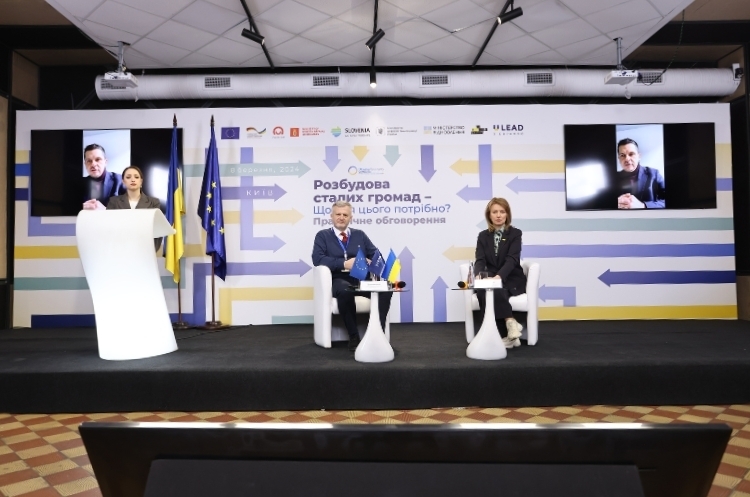Economy, environment and human capital - three priorities for sustainable municipalities’ development strategies
Experts, representatives of central and local authorities and the "third sector" discussed the possibilities of the Ukraine Facility for municipalities

On 8 March, Kyiv hosted a conference entitled "Building Sustainable Municipalities – What Does It Take?", organised by U-LEAD with Europe, a programme of cooperation between the European Union and its member states Germany, Denmark, Poland and Slovenia, Ukrainian authorities and local municipalities.
The conference took the form of a practical discussion aimed at stimulating fruitful debate and cooperation between representatives of Ukrainian municipalities and government with their European counterparts, as well as civil society activists and opinion leaders, to accelerate Ukraine's recovery.

Olena Shulyak, Chair of the Verkhovna Rada Committee on the Organisation of State Power, Local Self-Government, Regional Development and Urban Planning, made an opening address to the participants:
"In July 2022, the Verkhovna Rada developed methodological recommendations for the development of comprehensive restoration programmes for the territories of municipalities. U-LEAD with Europe experts were involved in the development of this legislation and helped a lot".
According to her, 151 de-occupied and war-affected municipalities have now participated in the development of strategic documents at their level. This work will form the basis for updated urban planning documents and municipality development strategies.
Olena Shulyak said that local developers today should take into account the following three aspects.
The first is economic. Many businesses have closed, some have relocated, and some are looking for new investment opportunities. When planning their activities, municipalities should now focus on what they can offer to entrepreneurs and businesses. "Maybe some logistics services. Maybe an industrial park. Maybe help with the extraction of raw materials, which will be the main thing for the new business," said the MP.
The second is human capital. Today, the demographic situation in our country is catastrophic: more than 8 million people (20% of the population) are abroad and 6.5 million are internally displaced. "And we do not fully understand in which municipality these people will stay. Therefore, municipalities will compete with each other for people who will work in companies that will have new investment opportunities," says Olena Shulyak.
The third is the environment. In her opinion, 'the worst thing that can happen to us is that we bury the rubble of the destruction in the ground, build a kindergarten according to new standards and paint it in bright colours. But the children will never go to the kindergarten because they have not returned to Ukraine with their parents, who have no job here. We cannot allow such a negative image.

The Kyiv event is part of the preparations for the Ukraine Recovery conference to be held in Berlin on 11-12 June this year. Europe's involvement in the life of Ukraine's territorial communities is currently very high. Tomasz Ostropolski, Decentralisation and Sectoral Reforms Specialist at the EU Delegation to Ukraine, reminded this.
"From the European Union's point of view, we see two strategic processes as urgent at the moment: EU enlargement and Ukraine's recovery. Regarding EU enlargement, in November the European Commission published its first report on Ukraine as a candidate country. It pays a lot of attention to the importance of the development of Ukrainian territorial communities for EU accession. In my experience, this is the first time that the EU has paid so much attention to this issue," said the EU representative.
He recalled that the Ukraine Facility programme, which provides €50 billion of funding to Ukraine, is responsible for the country's recovery. The programme is based on a so-called multi-level approach, which is based on local development.
"All this leads us to the key point: regional and local authorities will be the engine of Ukraine's recovery on its way to the EU. In practical terms, this means that we need to develop the capacities of local communities and unleash their potential," says Tomasz Ostropolski.
He assured that "the European Commission, through its flagship programme U-LEAD with Europe and its regional offices, will provide tangible support at both strategic and practical levels".
According to the EU representative, U-LEAD is already helping 20 municipalities to prepare 25 high-quality reconstruction projects in the fields of education, health, waste management, transport, water supply and sanitation. Thanks to this support, municipality residents from different gender and social groups will prepare complete application forms and receive developed project documentation for submission for funding.
During the discussion, Andrej Horvat, Deputy Director of the U-LEAD with Europe Programme, said that since 2016, the programme has supported a bottom-up approach, helping regional municipalities to strengthen, develop and increase opportunities for further progress.
"In 2014-2015, policymakers made a smart bet on decentralisation and strengthening the resilience of municipalities. Thanks to this, Ukrainians can no longer be defeated," said Andrej Horvat.
He added that Ukraine is currently in the process of change – at different levels and in different formats. "We at U-LEAD are trying to help. To do this, we need numerous good projects at the local level: investment projects with technical documentation. And this should develop to the national level. And then it will become part of joining the European Union – joining a club that shares common values," outlined Andriy Horvat the goal of the U-LEAD with Europe Programme.
If you have read this article to the end, we hope that means it was useful for you.
We work to ensure that our journalistic and analytical work is of high quality, and we strive to perform it as competently as possible. This also requires financial independence. Support us for only UAH 196 per month.
Become a Mind subscriber for just USD 5 per month and support the development of independent business journalism!
You can unsubscribe at any time in your LIQPAY account or by sending us an email: [email protected]





